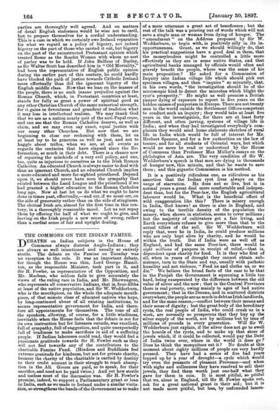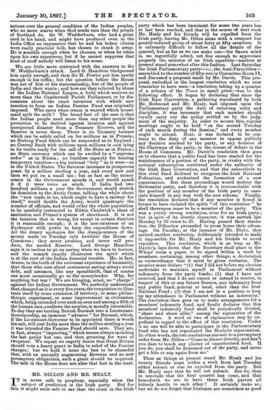THE COMMONS ON THE INDIAN FAMINE. D EBATES on Indian subjects
in the House of Commons always distress Anglo-Indians ; they are always so well intentioned and usually so entirely sterile. The debate on the Famine on Tuesday was no exception to the rule. It was an important debate, for though the House was thin, Lord George Hamil- ton, as the responsible Minister, took part in it, and ,Sir H. Fowler, as representative of the Opposition, and Mr. Maclean, who seldom fails to give accurately the -views of the ruling race in India, and Mr. Bhownagree, who represents all conservative Indians, that is, four-fifths at least of the native population, and Sir W. Wedderburn, who is the mouthpiece, on the whole the adequate mouth- piece, of that minute class of educated natives who hope, by long-continued abuse of all existing institutions, to secure representative government for India, and there- fore all appointments for themselves. The tone of all the speakers, allowing, of course, for a little windiness, inevitable when the House feels that the debate is not for its own instruction but for listeners outside, was excellent, full of sympathy, full of suggestion, and quite unexpectedly full of readiness to make sacrifices in aid of a suffering people. If Indian labourers could read, they would feel a passionate gratitude towards Sir H. Fowler such as they will not feel towards any of the contributors to the charitable Famine Fund. (Hindoos and Buddhists feel extreme gratitude for kindness, but not for private charity, because the charity of the charitable is carried by destiny to their credit account in their struggle to reach absorp- tion in the All. Givers are paid, so to speak, for their .sacrifice, and need not be paid twice.) And yet how sterile and useless most of the discussion was. Sir H. Fowler's promise, indeed, to support a Parliamentary grant or loan to India, such as we made to Ireland under a similar visita- tion, so strengthens the hands of the Government as to make of a mere utterance a great act of beneficence; but the rest of the talk was a pouring out of words which will not save a single man or woman from dying of hunger. The " amendment " on the Address proposed by Sir W. Wedderburn, to begin with, is positively silly in its in- opportuneness. Grant, as we should willingly do, that his practical suggestions have a good deal in them, that the moneylenders might be controlled a little more effectively as they are in some native States, and that agricultural banks managed by officials would often and gravely benefit the people, where was the sense of his main proposition ? He asked for a Commission of Inquiry into Indian village life which should pick out specimen villages, and then "inquire" so minutely, that, in his own words, "the investigation should be of the microscopic kind to detect the microbes which blight the ryot's prosperity." He might as well promise a British pauper dying of exposure to report in five years on the hidden causes of pauperism in Europe. There are not twenty men in the world outside the Settlement Offices competent to conduct such an inquiry ; they would take at least five years in the investigation, for there are at least forty different, and often jarring, systems of village life in India ; and when they had investigated everybody's com- plaints they would send home elaborate sketches of rural life in India which would be full of interest for Mr. Herbert Spencer, and for a few authorities on the law of tenure, and for all students of Oriental ways, but which would no more be read or understood by the House of Commons than Professor Max Mailer's essays on the philologies of Asia are. The very condition of Sir W. Wedderbum's speech is that men are dying in thousands of hunger now, this minute, and that he wants to save them ; and this gigantic Commission is his method.
It is a positively ridiculous one, as ridiculous as his assertion that the Indian ryot lives always on the verge of starvation. He does not so live, but is in normal years a great deal more comfortable and indepen- dent than, but for the Poor-law, the English agricultural labourer would be. What is the beneficial effect of wild exaggeration like this ? There is misery enough in India, God knows ! as there is also in England, and owing to the terrible density of the population the misery, when shown in statistics, seems to cover millions ; but the majority of cultivators get a fair living, and Earth everywhere refuses to give more than that to the actual tillers of the soil. Sir W. Wedderburn will reply that, were he in India, he could produce millions who are only kept alive by charity, and he would be within the truth. But if India were as well off as England, and had the same Poor-law, there would be eight millions of paupers in receipt of relief,—that is, dependent upon charity for food. It is they who first of all, when in years of drought they cannot obtain sub- sistence, turn to the State and say, usually with pathetic humility and not violence, "Feed us and clothe us' or we die." We believe the broad facts of the ease to be that in the Punjab the Government is squeezing a little too hard, being exasperated by the difference between the old value of silver and the new ; that in the Central Provinces there is real poverty, owing mainly to ages of bad native government ; that in the Deccan, and in scattered districts everywhere, the people are as much in debt as Irish landlords, and for the same reason,—conflict between their means and their sense of dignity ; but the great body of the hereditary ryots, the real people of India, who could crush us in a week, are normally so prosperous that they buy up the silver supply of the world, not by millions but by tens of millions of pounds in every generation. Will Sir W. Wedderburn just explain, if the silver does not go to swell the hoards of the ryots, and to make up that store of jewels which, if it could be collected, would pay the Debt of India twice over, where in the world it does go ? Does he think the mosquitoes eat it ? No doubt at this moment about eighty millions of people are very hardly pressed. They have had a series of five bad years topped up by a year of drought—a cycle which would try even the peasants of pleasant Provence—and when with sighs and sullenness they have resolved to sell their jewels, they find them worth just one-half what they gave for them in coin. It is most pitiful, so pitiful that we, alone in England, till Sir H. Fowler spoke out, ask for a great national grant in their aid; but it is not made more pitiful, but less, by unfounded lamen- tations over the general condition of the Indian peoples, who no more starve when God sends rain than the people of Scotland do. Sir W. Wedderburn, who had a great card in his hand, and might have produced even in the India Office an impression that he and his baboo clients were really practical folk, has chosen to chuck it away. He is sensible enough when he chooses, or when he relies upon his own experience, but if he cannot suppress that kind of stuff nobody will listen to his sense.
We are little more contented with the answers to Sir W. Wedderburn's attack. Lord G. Hamilton bludgeoned him easily enough, and then Sir H. Fowler put him neatly enough in his coffin ; but the question before the House was not of him or his statesmanship, but of the people of India and their wants ; and how are they relieved by abuse of the Indian National League, a body which matters no more than the Camberwell Parish Parliament, or by dis- cussions about the exact intention with which new taxation to form an Indian Famine Fund was originally imposed. Who cares when cream is wanted which house- maid spilt the milk ? The broad fact of the case is that the Indian people need more than any other people the protection to be derived against invasion and against unexpected disaster from a Treasury Reserve, and the Reserve is never there. There is no Treasury balance which can be safely called on for millions as in Prussia ; no Sinking Fund which can be suspended as in England ; no Central Bank with millions upon millions in coin lying in its vaults ready for the call of the State as in France ; no State currency which can be swelled by a "supreme order" as in Russia ; no limitless capacity for bearing temporary taxation—a big national "levy" as it were—as in the United States. The Revenue increases in prosperous years by a million sterling a year, and every now and then we put on a. small tax ; but as fast as the money comes in the Government spends it, and would spend it if it were twice as much. If India had two hundred millions a year the Government would stretch its dominion to the Arctic Ocean, talking the while about the "new trade in ice, which ought to have a railway for itself," would double the Army, would quadruple the number of officials, and would order the whole population to be carefully instructed in Edwin Chadwick's ideas of sanitation and Pitman's system of shorthand. It is not the taxation that is wrong, for except in certain districts it is reasonable enough ; it is the non-existence of an Exchequer with power to keep the expenditure down. All the dreary apologies for the disappearance of the money made on Tuesday only bewilder the House of Commons ; they never produce, and never will pro- duce, the needed Reserve. Lord George Hamilton says it is useless to go on saving when we have to borrow, and the remark exactly illustrates the spirit which is at the root of the Indian financial trouble. He, in fact, denies, in the teeth of the universal experience of humanity, that those who care about continuous saving always avoid debt, and assumes like any spendthrift, that of course one must occasionally go to the moneylender. Why, for anything but war ? We are bringing, mind, no " charge " against the Indian Government. We perfectly understand that, changed as it is every five years, the temptation to illus- trate itself by some extension of territory, or some philan- thropic experiment, or some improvement in civilisation which, being extended over such an area and among a fifth of the human race, swallows the surplus, is morally irresistible. To-day they are turning British Burmah into a Lieutenant- Governorship, an immense " advance " for Burmali, which, if the Lieutenant-Governor to be appointed there is worth his salt, will cost India more than the million sterling a year it was intended the Famine Fund should save. They are, in fact, always "improving," which means always spending the last penny but one, and then groaning for want of twopence. We repeat we eagerly desire that Great Britain should vote a heavy grant to India in relief of the Famine charges ; but we hold it none the less to be shameful that, with an annually augmenting Revenue and no new peremptory obligations, such a grant should be required. The talk in the House does not alter that fact in the least.



















































 Previous page
Previous page